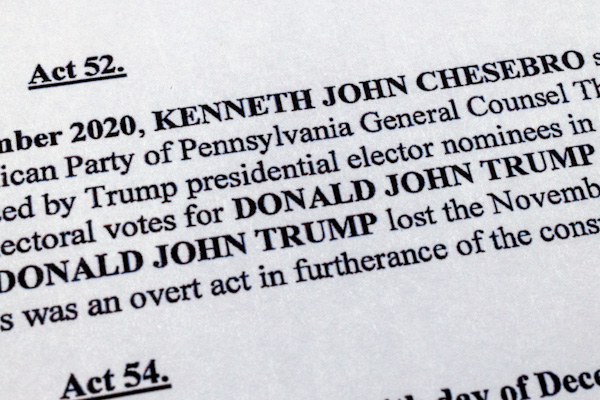Meet Kenneth Chesebro, 'the brains' behind Trump's fake elector scheme

The indictment in Georgia against former President Donald Trump is displayed Aug. 14. Trump and several allies, including lawyer Kenneth J. Chesebro, have been indicted in Georgia over efforts to overturn his 2020 election loss in the state. Photo by Jon Elswick/The Associated Press.
A lawyer accused of crafting a fake elector strategy on behalf of former President Donald Trump was once a registered Democrat who worked after his graduation from Harvard Law School for his liberal mentor, Laurence Tribe.
The lawyer, Kenneth J. Chesebro, was “the brains” behind the fake elector scheme, Tribe told the Washington Post while expressing disappointment with his mentee.
Chesebro, an appellate lawyer, “was inventing legal fiction that paid no attention to the law and creating a pretext for a conspiracy to steal an election,” Tribe said.
Chesebro is among eight lawyers indicted in Georgia for allegedly participating with Trump in a racketeering enterprise to overturn the results of the 2020 presidential election.
Chesebro outlined his “January 6 scenario” in a Dec. 6, 2020, memo, report MSNBC and the New York Times. In the memo, Chesebro said fake Trump electors should meet in six contested states, cast their votes and send them to Washington, D.C., for then-Vice President Mike Pence to accept “in a solemn and constitutionally defensible manner” Jan. 6, 2021, the memo said.
Lawsuits should be pending in the contested states at the time, Chesebro advised.
Pence should take the position that it is his constitutional power and duty as president of the U.S. Senate to count the fake votes, and that “anything in the Electoral Count Act to the contrary is unconstitutional,” the memo said. The vote could be managed so that then-candidate Joe Biden would have to seek U.S. Supreme Court review.
“Letting matters play out this way would guarantee that public attention would be riveted on the evidence of electoral abuses by the Democrats and would also buy the Trump campaign more time to win litigation that would deprive Biden of electoral votes and/or add to Trump’s column,” Chesebro wrote.
Chesebro had earlier endorsed a fake elector strategy in Wisconsin to protect Trump’s rights in case he won a suit contesting the election results there.
In both memos, Chesebro cited writings by Tribe in support of his argument. Tribe has said the memos “relied on a gross misrepresentation of my scholarship,” according to an essay published Aug. 8 on the legal website Just Security that was noted by the New York Times.
Chesebro graduated from Harvard Law in 1986. He was raised in Wisconsin and attended Northwestern University as an undergrad. After law school, he clerked for U.S. District Judge Gerhard A. Gesell of the District of Columbia and then returned to Harvard to work with Tribe.
Chesebro’s views apparently changed after he claimed to have made millions of dollars from an investment in a bitcoin fund, according to the Washington Post. He withdrew his money before the cryptocurrency market crashed and then reinvested.
In 2016, Chesebro changed his political registration to unaffiliated. That same year, he began working with then-Chapman University law professor John Eastman on an amicus brief that called birthright citizenship a “vestige of feudal times.” Eastman has also been indicted in the Georgia RICO case.
Chesebro has “kept a low profile” since Jan. 6, 2021, according to the Washington Post. He is now living in Puerto Rico.
“His retreat from public life since Jan. 6 has deepened the mystery for former classmates and colleagues puzzling over how he became a central player in plans to reverse the outcome of a democratic election,” the article reports.
Chesebro began working for the New York personal injury law firm Napoli Shkolnik, heading a new “Law & Motions Department,” according to an internal announcement in October.
Chesebro was brought on as an independent contractor, but the firm ended ties with him after his indictment in Georgia, partner Paul J. Napoli told the Washington Post. Chesebro’s name was never added to the firm’s website.
Even before the indictment, Napoli predicted that Chesebro would be receiving less work from the firm.
“It’s a shame because he’s a brilliant mind,” Napoli told the Washington Post.
Chesebro didn’t respond to the Washington Post’s request for comment. He issued a statement last summer as part of an interview with Talking Points Memo.
“It is the duty of any attorney to leave no stone unturned in examining the legal options that exist in a particular situation,” he said.
Hat tip to How Appealing.
See also:
ABAJournal.com: “Trump’s election-subversion co-conspirators included DOJ official, 4 other lawyers, indictment says”
ABAJournal.com: “Why the Jan. 6 committee highlights actions of 3 lawyers and an ex-law prof in DOJ referrals against Trump”
Write a letter to the editor, share a story tip or update, or report an error.


